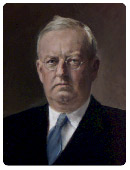Former justices

Justice John D. Wickhem
Wisconsin Supreme Court Justice: 1930–1949Life: 1888–1949
"Wickhem was a deadpan humorist. One story he told was that after he won election to the Court, a family friend congratulated him on winning election to the Superior Court (equivalent to today's municipal courts). Wickhem quietly corrected him, saying it was the Supreme Court. The friend said, 'Oh that's all right. Someday you'll get to the Superior Court." – remarks by Judge Thomas E. Fairchild (1998)
John Dunne Wickhem was born in Beloit, Wisconsin, on May 25, 1888. He graduated from Beloit College in 1910 and remained in Beloit as a high school teacher and athletic coach until 1914, when he entered the University of Wisconsin Law School. He graduated in two years by attending summer sessions.
Upon graduation, he started work at the law office of Attorney Burr W. Jones (who later became a state Supreme Court justice). Wickhem left Madison in 1917 and joined a Milwaukee firm.
During World War I, Wickhem worked in the War Trade Intelligence Bureau in Washington, D.C. Returning to Wisconsin in 1919, he was appointed an assistant professor at the University of Wisconsin Law School. He became a full professor in 1925 and remained on the faculty until his appointment to the Wisconsin Supreme Court on September 25, 1930. Wickhem won election to the bench in 1933 and 1943.
He wrote the opinion in State ex rel Martin v. Heil (1942) which decided the succession as governor when Governor-Elect Orland S. Loomis died before taking office. It was decided that the sitting governor, Julius P. Heil, would not continue in office, but that Lieutenant Governor Walter S. Goodland would serve out Loomis' term.
His opinions were described as "excellent examples of legal reasoning and clarity of expression." Wickhem said that he became a student of the law in 1914 and remained so for life. He once said that his greatest satisfaction came from "digging into a tough legal decision."
A brilliant conversationalist and an accomplished speaker, Wickhem was also described as a "flashy dresser." He was a calm, objective, patient and understanding teacher and counselor. At his memorial service, his colleagues on the bench spoke of his equable temperament and balanced personality.

